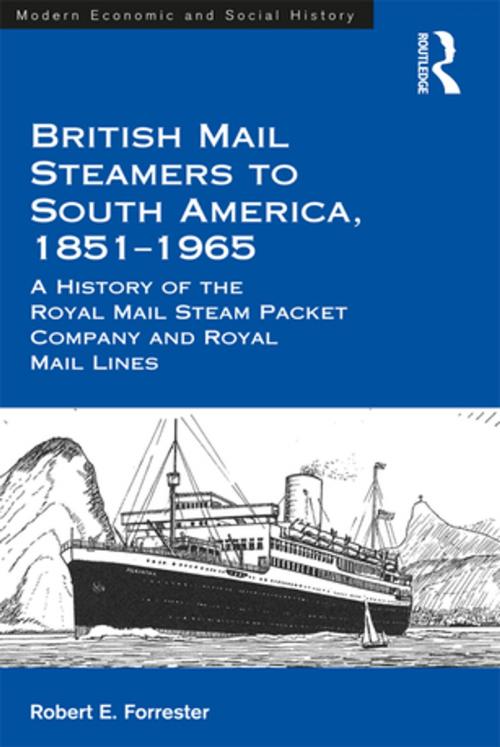British Mail Steamers to South America, 1851-1965
A History of the Royal Mail Steam Packet Company and Royal Mail Lines
Nonfiction, History, Modern, 19th Century, 20th Century| Author: | Robert E. Forrester | ISBN: | 9781317171843 |
| Publisher: | Taylor and Francis | Publication: | April 15, 2016 |
| Imprint: | Routledge | Language: | English |
| Author: | Robert E. Forrester |
| ISBN: | 9781317171843 |
| Publisher: | Taylor and Francis |
| Publication: | April 15, 2016 |
| Imprint: | Routledge |
| Language: | English |
During the nineteenth century Britain’s maritime, commercial and colonial interests all depended upon a regular and reliable flow of seaborne information from around the globe. Whilst the telegraph increasingly came to dominate long-distance communication, postal services by sea played a vital role in the network of information exchange, particularly to the more distant locations. Much importance was placed upon these services by the British government which provided large subsidies to a small number of commercial companies to operate them. Concentrating initially on the mail service between Britain and South America, this book explores the economic and political involvement of, at the outset, The Royal Mail Steam Packet Company (later, Royal Mail Lines) from 1851 until 1874. (The Company’s West Indies services were subsidized from 1840 until the early years of the 20th century.) As well as providing a business history of the Royal Mail companies the book reveals much of the development of Brazil and Argentina as trading nations and the many and varied consequences of maintaining a long-distance mail service. Improved ship design led to larger vessels of greater cargo capacities, essential to the growth of the lucrative, and highly competitive, import/export trades between Britain and Europe and South America. The provision of increased passenger services contributed to the very considerable British financial, commercial and industrial interests in Latin America well into the 20th century. The book also addresses the international competition faced by Royal Mail Lines which reflected Britain’s progressively diminishing dominance of global trade and shipping. In all this book has much to say that will interest not only business historians but all those seeking a better understating of Britain’s maritime and economic history.
During the nineteenth century Britain’s maritime, commercial and colonial interests all depended upon a regular and reliable flow of seaborne information from around the globe. Whilst the telegraph increasingly came to dominate long-distance communication, postal services by sea played a vital role in the network of information exchange, particularly to the more distant locations. Much importance was placed upon these services by the British government which provided large subsidies to a small number of commercial companies to operate them. Concentrating initially on the mail service between Britain and South America, this book explores the economic and political involvement of, at the outset, The Royal Mail Steam Packet Company (later, Royal Mail Lines) from 1851 until 1874. (The Company’s West Indies services were subsidized from 1840 until the early years of the 20th century.) As well as providing a business history of the Royal Mail companies the book reveals much of the development of Brazil and Argentina as trading nations and the many and varied consequences of maintaining a long-distance mail service. Improved ship design led to larger vessels of greater cargo capacities, essential to the growth of the lucrative, and highly competitive, import/export trades between Britain and Europe and South America. The provision of increased passenger services contributed to the very considerable British financial, commercial and industrial interests in Latin America well into the 20th century. The book also addresses the international competition faced by Royal Mail Lines which reflected Britain’s progressively diminishing dominance of global trade and shipping. In all this book has much to say that will interest not only business historians but all those seeking a better understating of Britain’s maritime and economic history.















